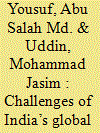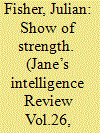|
|
|
Sort Order |
|
|
|
Items / Page
|
|
|
|
|
|
|
| Srl | Item |
| 1 |
ID:
136587


|
|
|
|
|
| Summary/Abstract |
India is emerging as a global economic power and expanding its military capabilities. Its maritime posture in the Indo-Pacific has made it an important stakeholder in the Asia-Pacific strategic ambiguity. The country is invited in almost all global forums and encouraged to play active role in the international affairs. These are some of the key indicators of India’s global emergence. By contrast, India is yet to take strong footholds in several global issues, while negotiating with international powers e.g. the USA and China. Some major challenges of the global emergence of India are its foreign policy predicaments, neighbourhood compulsions and China bogey, compulsions of energy import, limits of its soft power capabilities, internal security threats and domestic underdevelopment. In this context, the two important research questions of this paper are: which factors indicate India as an emerging global power? And, what are the challenges for India’s global emergence? The paper concludes that due to emerging economic and military power, India’s role in the international arena are increasing, but the country faces both internal and external challenges to project itself as a global power.
|
|
|
|
|
|
|
|
|
|
|
|
|
|
|
|
| 2 |
ID:
136644


|
|
|
|
|
| Summary/Abstract |
China's military developments and growing naval capabilities are the focus of much discussion among strategists and policy makers. China's moves in this direction are of particular concern because of the implications to maritime security in the region, particularly to countries that have territorial disputes. Its burgeoning military power and growing naval and maritime capability are linked to the country's overall maritime strategy and rising profile in the international arena, raising questions outside the region as to her long-term intentions in the Asia-Pacific region. Of particular interest is China's Anti-access Area-denial (A2/AD) strategy. This paper undertakes an analysis of China's military with specific reference to the A2/AD strategy, and is premised on the belief that the A2/AD strategy is a component of overall Chinese maritime strategy. This paper suggests that People's Liberation Army Navy military capabilities and force developments are inter-related to the evolution of China's maritime strategy, and that China's building onto A2/AD would pose a significant threat to regional security.
|
|
|
|
|
|
|
|
|
|
|
|
|
|
|
|
| 3 |
ID:
134943


|
|
|
|
|
| Summary/Abstract |
This article examines desertion in civil wars, focusing on the role of combatants’ hometowns in facilitating desertion. Analyzing data from the Spanish Civil War, the article demonstrates that combatants who come from hill country are considerably more likely to desert than combatants whose hometowns are on flat ground. This is because evasion is easier in rough terrain. The finding implies that the cohesion of armed groups depends on control, not just positive incentives, and that control of territory in civil wars goes beyond rebel–government contestation, and consists also of control behind the lines. The article bridges micro and macro approaches to civil wars by indicating the multiple uses to which individuals can put structural conditions like rough terrain. This helps to clarify the macro-level link between rough terrain and civil war. It also shows that micro-level research can profitably examine structural variables alongside individual characteristics and endogenous conflict dynamics.
|
|
|
|
|
|
|
|
|
|
|
|
|
|
|
|
| 4 |
ID:
136646


|
|
|
|
|
| Summary/Abstract |
The global order is undergoing a churn and the general pointers forecast an era of a cataclysmic systemic change. The pronouncement of the “Rebalance to the Asia-Pacific”, indicating a shift in US strategic focus to Asia, has captured the imagination of the scholars and the analyst community alike. Within the prevailing nebulous and uncertain global architecture, this strategic recast by the dominant security provider has far-reaching implications. Considering the contextual underpinnings of various policy articulations and the geographic construct of this strategic reorientation, the maritime element would play a crucial role in this re-alignment of US strategic posture. This paper aims to deconstruct the maritime–military context of the US rebalance and draw out necessary implications for international, regional and Indian strategic calculus.
|
|
|
|
|
|
|
|
|
|
|
|
|
|
|
|
| 5 |
ID:
135990


|
|
|
|
|
| Summary/Abstract |
Recent radical changes in the application of military power and service patterns have triggered demands for a change in military identity. This article aimed to examine the ability of military identity to predict perceived military performance and attitudes beyond the contributions of personality traits and Hardiness in Norwegian military academy cadets (N = 117). Military skills, general military competence, and organizational commitment were measured by self-report. Military Identity, in particular operational identity, was found to predict both perceived military competence and skills. Furthermore, Individualism negatively predicted organizational commitment. As the first investigation of the unique influence of Military Identity on perceived skills and competence in the Norwegian armed forces, this study identifies operational identity as an important predictor of military performance. Implications for training as well as leadership development programs are discussed.
|
|
|
|
|
|
|
|
|
|
|
|
|
|
|
|
| 6 |
ID:
136645


|
|
|
|
|
| Summary/Abstract |
As the center of world economic growth and world politics is shifting to East Asia, the region is undergoing a strategic transformation due to the ongoing power shift. As a result, major regional powers, namely the USA, China, Japan, India, South Korea, Australia and South East Asian states are building up their military potential, in particular naval forces, amid aggravating regional security problems and escalation of maritime disputes. This paper aims to assess regional strategies and military buildup in the Indo-Pacific. With the USA seeking to preserve dominance in the region, China trying to realign the regional power dynamics in its favor, Japan aiming to preserve its place as one of the regional leaders, India and Russia with their goals to become independent powers, and middle and small powers searching for an adequate answer to regional challenges, East Asia and the Indo-Pacific are clearly showing a complex dynamics of competing regional strategies and visions of regional order.
|
|
|
|
|
|
|
|
|
|
|
|
|
|
|
|
| 7 |
ID:
134556


|
|
|
|
|
| Summary/Abstract |
For the first time in history, Russia, previously only as a military power, now has a chance to enter the Asia-Pacific region as a factor of peace. And this may make it a unique player, so much needed to balance Asia.
|
|
|
|
|
|
|
|
|
|
|
|
|
|
|
|
| 8 |
ID:
136016


|
|
|
|
|
| Summary/Abstract |
Ugandan president Yoweri Museveni has removed or nullified political contenders threating his chances of re-election in 2016. Julian Fisher examines Ugandan politics and the likelihood of military coups or rebel insurgency against the president.
|
|
|
|
|
|
|
|
|
|
|
|
|
|
|
|
|
|
|
|
|